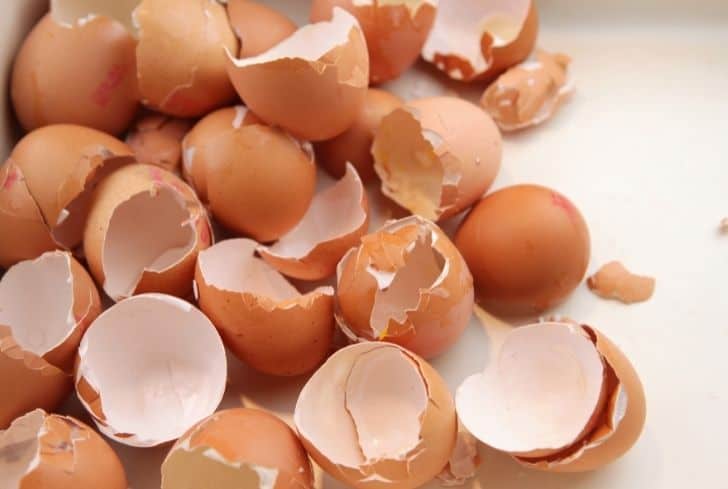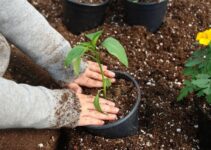What is the world without eggs? They are the foundation upon which reproduction is based. With regards to their consumption, eggs are one of the few foods that should be classified as “superfoods”. They are loaded with nutrients, some of which are rare in the modern diet and human beings have consumed eggs for thousands of years.
Of course, the egg cannot exist on its own without some walls holding it together. These walls are commonly referred to as eggshells and are pretty worthless once you crack them open and have your egg with you. Well, think again! Eggshells are incredibly helpful when it comes to composting. This article is an in-depth look into composting eggshells.
Can You Put Eggshells in Compost?
You guessed it, yes! You can put eggshells in compost. Many people do not know that using eggshells in the garden can help in many ways. Well, you should know that adding eggshells to your compost will help add calcium to the make-up of your final compost.
Calcium is an important nutrient that helps plants build cell walls and without it, plants cannot grow as fast. In the case of some vegetables like tomatoes and squash, the fruit will develop blossom end rot because there is simply not enough building material or calcium coming into the plant.
Using eggshells in the vegetable garden compost can help prevent this. You do not need to crush the eggshells before composting them, but doing it will help speed up how fast the eggshells will break down in the compost.
Additionally, consider washing them before composting them as doing this will not attract the nosy pests and animals who are intent on eating the shells. Cleaning the shells also reduces the risk of diseases that raw eggs pose, like salmonella.
Eggshells are often clearly identifiable even after the compost product is finished. This is not a problem, although some people might not like it. To avoid this, let the shells dry out for a few days or place them in a warm oven to dry more quickly before composting them.
Drying the shells allows them to crush more completely before you add them to your compost bin. The type of salmonella that lives in chickens often gets transferred to the shell and then to the egg when the shell is cracked.
Cooking your eggs kills salmonella bacteria, and so does the hot composting process when the temperature rises above 60 – 71°C (140 – 160°F). After the composting process is finished and cured, most pathogens will be brought to a similar level as the surrounding soil, thus reducing the number of salmonella bacteria in your compost.
The trick with composting eggshells is to grind them up, with the rule of composting being the smaller the particle size, the better. A study from Alabama Cooperative Extension compared coarsely ground eggshells, crushed by hand, to finely ground eggshells, resembling a fine powder, along with a comparison to pure calcium Ca(OH)2 and agriculture lime.
The Alabama study revealed the coarsely ground eggshells “were not much better than nothing at all.” However, the finely ground eggshells performed just as well as the pure calcium, both also outperformed the agriculture lime. Use coffee grinders to crush your eggshells into a fine powder.
You can also boil them and let the concoction sit overnight. The next day, strain the eggshells out of the water, and you have a liquid calcium solution. Each eggshell adds about four milligrams of calcium and two cups of the solution per plant should be adequate. Apply about every two weeks.
Can You Compost Boiled Eggshells?
Well, you can compost boiled eggshells. Eggshells are made of calcium carbonate, (CaCO3) and boiling them creates a liquid calcium solution (Ca(OH)2). This means the solution can also be used in the compost, just as much as the eggshells would.
Dr. Jeff Gillman, in his book, “The Truth About Garden Remedies”, discusses an interesting experiment. He took 1 eggshell, boiled it, and then let it sit for 24 hours. The minerals in the water were then analyzed and the result was that about 4mg of both calcium and potassium were released into the water.
An eggshell contains about 2,000mg of calcium and the boiling and soaking process released only 0.2% of the calcium. The conclusion here is that the boiling water did not have much effect on the eggshell, meaning if it were to be composted before or after boiling, not much effect would be noticed.
Go ahead and compost those boiled eggshells the same way you would have those that were not boiled. Do not forget to crush them into a fine powder, to help speed up the process, as well as ensure all eggshells decompose.
Can You Compost Cooked Eggshells?
Of course, you can. It makes no difference if the eggshells are cooked or not, before composting. They will be as hard after cooking as they were before. You can compost cooked eggshells but do not expect them to break down like everything else that goes into the compost.
Cooked eggs can be disposed of in a compost bin in the same way as raw eggs. However, they need to be finely ground before composting. Grounding them ensures that they will completely degrade inside the composting bin.
As they will definitely attract vermin, grounding the eggs also ensures they have less success in finding the compost, or at least does not indicate to them that there is something for them in the composting heap.
However, if you do not have so many eggshells, go ahead and throw them inside the compost along with a load of other materials. It is unlikely the shells will be found in the general mass before everything around it has rotten away.
Cooking your eggshells also kills the salmonella bacteria present in eggs. After the composting process is finished and cured, most pathogens, including salmonella will be reduced or eradicated completely.
Do Eggshells in Compost Attract Rats?
The answer here is both yes and no. With composting any food scraps, pests such as rats have to be attracted. Any residue left inside the eggshells will quickly disperse and will invite the rats into the mix. Also, if the eggs were left whole inside the composting bin, the rats will come for them.
However, if you clean the eggshells and/or grind them up into a fine powder, the rats might not suspect it and will not come for them. Also, and very interesting to note here, eggshells can be used in the garden to help fight off pests like slugs, snails, cutworms and other crawling pests.
Crushed eggshells work much like diatomaceous earth on these pests. When crawling pests cross over an area in the garden where crushed eggshells have been spread, the eggshells make several small cuts in the pests. The pests then dehydrate and die due to these cuts.
Therefore, if your eggshells do not crush completely, and end up in the garden, they might because of deaths for these pests. You can also add coffee grounds fruit peels and other leafy material in the compost together with the eggshells, as they do not attract rats. Hiding them together might accomplish the same feat.
Should You Wash Eggshells Before Composting?
It is not a requirement to wash eggshells before composting them, but you definitely need to. First, cleaning them speeds up how fast they will break down inside the composting bin.
Secondly, cleaning them is important so as not to attract animal pests.
Thirdly and most importantly, cleaning eggshells reduces the risks of diseases posed by raw eggs. Eggs might carry salmonella bacteria which can contaminate the compost and be transferred to the garden. The bacterium salmonella can easily be transferred to humans and that is why the USDA requires the egg industry to take many steps to ensure the safety of the food that comes from farms to the consumer.
Farmers are required to wash eggs before packaging to reduce salmonella contamination. The type of salmonella that lives in the chicken often gets transferred to the shell and then to the egg if the shell is cracked.
Eggshells might contain a small percentage of the salmonella bacterium and the rest can be killed by composting process, but it is a risk. The safest thing to do is to clean the shells before composting them.
Another route to use is to boil or cook the eggs and of course the eggshells. Cooking your eggs kills salmonella bacteria, and so does the hot composting process when the temperature rises above 60-71°C (140-160°F). Hot composting can also kill a variety of pathogens and weed seeds.
Heating the eggshells will kill the small percentage of the salmonella present, making the composting process and final compost a bit safe. You can also choose to air-dry your eggshells for a day or two before composting them.
Drying them also kills any pathogens surrounding them and also makes it easier to crush them into smaller particles. For those who choose to clean them, just rinse the eggshells with cool water and let them dry so that it becomes easier to crush them.
How Long Does It Take For Eggshells to Compost?
Eggshells are calcified carbonates and do not decompose. Instead, they react with the soil or compost-based acids. That is why it is recommended that you grind them up into a fine powder before composting them, as this will dissolve away over time.
If you fail to, you can dig up eggshells even after five years, and fins that will not have decomposed at all. In a study in which large eggshell pieces were buried in a balanced soil medium and dug up after one year, examined, reburied, and dug up to examine again after three years, the eggshells showed no signs of decomposition after either one or even three years underground.
As such, it is hard to answer exactly how long it takes for eggshells to compost, but based on the three-year study, it seems that eggshells decompose incredibly slowly and possibly even not at all
Eggshells are made of calcium carbonate, (CaCO3). The calcium carbonate in an eggshell will dissolve over time when you compost the eggshells because the contents of your compost will most likely be acidic.
How long this dissolving process takes, depends on the strength of acidity present in the forming compost. This might explain why you will still see fragments of eggshells in the finished compost. The dissolving process, however, continues if eggshells make it through the compost and end up in the soil.
In most cases, there exists a level of acidity in soil that will continue to dissolve the calcium carbonate, from whatever source. Eventually, the eggshells will completely disappear but this could take a few months or it could take years.
References:
https://www.canr.msu.edu/news/adding_eggshells_to_compost
https://expandusceramics.com/qa/quick-answer-should-you-wash-eggshells-before-composting.html






